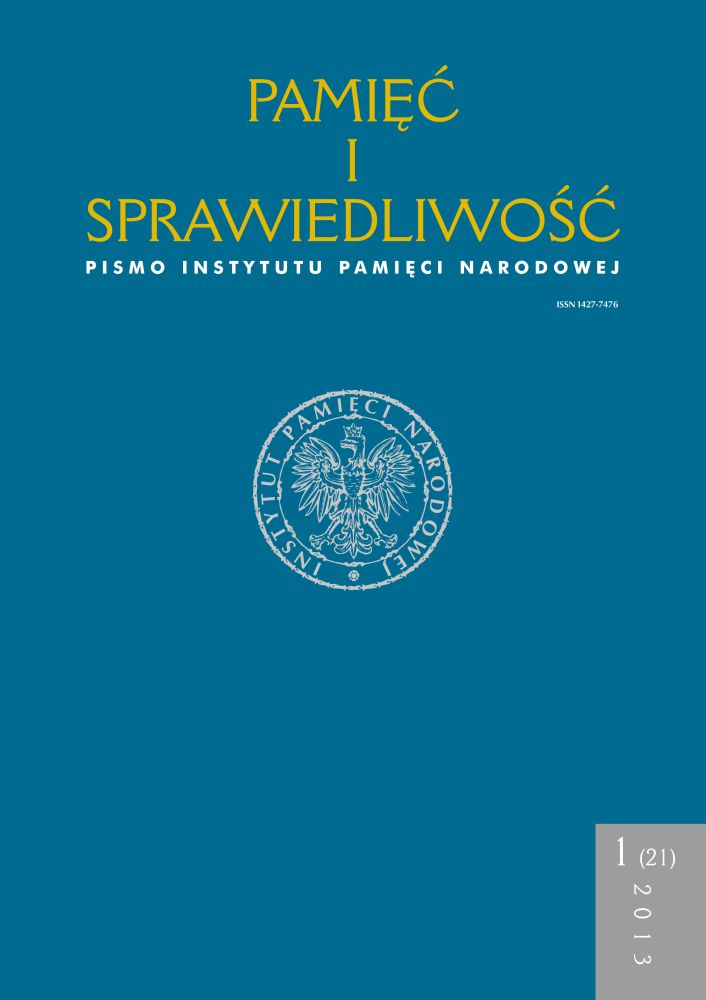Międzynarodowi terroryści w PRL – historia niewymuszonej współpracy
Pamięć i Sprawiedliwość, V. 21 N. 1 (2013), pages: 275-315
Publication date: 2013-06-30
Abstract
Riferimenti bibliografici
W. Gadowski, P. Wojciechowski, Tragarze śmierci. Polskie związki ze światowym terroryzmem, Warszawa 2010, Warszawa – bazą terrorysty Abu Nidala, „Przegląd Wiadomości Agencyjnych” 1987, nr 32, M. Rudziński, Abu Nidal – polski ślad, „Sztandar Młodych”, 21–23 IX 1990, S.K. Anderson, S. Sloan, Historical Dictionary of Terrorism, Plymouth 2009, B. Hoffman, Oblicza terroryzmu, Warszawa 2001, Ch.C. Harmon, Terrorism Today, Portland 2000, S. Cenckiewicz, Długie ramię Moskwy. Wywiad wojskowy Polski Ludowej 1943–1991. (Wprowadzenie do syntezy), L. Misiak, G. Wierzchołowski, Zakładnik prezydenta Komorowskiego, „Gazeta Polska” 2010, nr 34, D. Kawczynski, Seeking Gaddafi. Libya, The West and the Arab Spring, Londyn 2010, R. Pleśniak, R. Kamiński, Szkoła zbrodni, „Wprost” 2001, nr 39, E. Zając, Polska w Połączonym Systemie Ewidencji Danych o Przeciwniku (PSED) – próba rekonstrukcji [w:] Ofiary imperium. Imperia jako ofiary. 44 spojrzenia, red. A. Nowak, Warszawa 2010, s. 543–556, R.C.S. Trahair, R.L. Miller, Encyclopedia of Cold War Espionage, Spies and Secret Operations, New York 2009, J.L. Outman, E.H. Outman, Terrorism Biographies, Farmington Hills 2003, P. Gasztold-Seń, „Szakal” w Warszawie, „Pamięć.pl” 2012, nr 2 R. Faligot, R. Kauffer, Służby specjalne. Historia wywiadu i kontrwywiadu na świecie, przeł. M. Matuszyn-Stefańska, K. Skawina, Warszawa 2006, P. Machcewicz, „Monachijska menażeria”. Walka z Radiem Wolna Europa 1950–1989, Warszawa 2007, W. Dietl, K. Hirschmann, R. Tophoven, Terroryzm, tłum. zbiorowe, Warszawa 2009, M. Wolf, A. McElvoy, Człowiek bez twarzy. Autobiografia szefa STASI, przeł. K. Dmoch, Warszawa 1999, J. Follain, Carlos Szakal. Czerwony terrorysta, przeł. P. Lipszyc, Warszawa 1999, Ch. Andrew, W. Mitrochin, Archiwum Mitrochina II. KGB i świat, przeł. K. Bażyńska-Chojnacka, Poznań 2009, H. Schwan, Erich Mielke – żywot w służbie Stasi, przeł. M. Pindel, Warszawa 2001, M. Kopp, Die Terrorjahre. Mein Leben an der Seite von Carlos, Monachium 2007, R. Lefèvre, Hama and Beyond: Regime-Muslim Brotherhood Relations since 1982 [w:] L. Khatib, R. Lefèvre, J. Qureshi, State and Islam in Baathist Syria: Confrontation or Co-optation?, Fife 2012, St Andrews Papers on Contemporary Syria [seria], wydane przez University of St Andrews Centre for Syrian Studies R. Borkowski, Terroryzm ponowoczesny. Studium z antropologii polityki, Toruń 2006, M. Kordela, Bractwo Muzułmańskie – kuźnia kadr współczesnego terroryzmu islamskiego [w:] Terroryzm – globalne wyzwanie, red. K. Kowalczyk, W. Wróblewski, Toruń 2006, s. 155–172, P. Gasztold-Seń, Der Sicherheitsapparat der Volksrepublik Polen und die Rote Armee Fraktion, „Inter Finitimos” 2011, nr 9, s. 144–154 The Politics of Terrorism – A Survey, red. A.T.H. Tan, London 2006, ; J.R. Thackrah, Encyclopedia of Terrorism and Political Violence, New York 1987, P. Seale, Abu Nidal: A Gun for Hire, London 1992, G. Corm, Bliski Wschód w ogniu. Oblicza konfliktu 1956–2003, Warszawa 2003, M. Deeb, Syria’s Terrorist War on Lebanon and the Peace Process, New York 2003, J. Trento, S. Trento, The United States and Iran: Part VII: The CIA’s Solution – GOLDENROD, 12 VIII 2009, G. Simons, Libya and the West. From Independence to Lockerbie, Oxford 2003, B.L. Davis, Qaddafi, Terrorism and the Origins of the U.S. Attaca on Libya, Nowy Jork 1990, J.P. Zanders, The Return of Gaddafi and His Chemical Weapons Spectre, Paris, EU Institute for Security Studies 2011, J. Sinai, Libya’s Pursuit of Weapons of Mass Destruction, „The Nonproliferation Review” 1997, nr 3, s. 92–100. M. Jander, Differenzen im antiimperialistischen Kampf. Zu den Verbindungen des Ministerium für Staatssicherheit mit dem RAF und dem bundesdeutschen Linksterrorismus [w:] Die RAF und der linke Terrorismus, red. W. Kraushaar, Hamburg 2006, s. 696–713, International Terrorism in the Bulgarian State Security Files. Documentary Volume (Electronic Edition), The Committee on Disclosure of Documents and Announcing Affiliation of Bulgarian Citizens to the State Security and the Intelligence Services of the Bulgarian National Army, Sofia 2011. T. Walker, A. Gowers, Arafat, przeł. I. Szybilska, Warszawa 2005, J. Tomasiewicz, Terroryzm na tle przemocy politycznej (Zarys encyklopedyczny), Katowice 2000, R. Kłosowicz, U.S. Marines jako narzędzie polityki zagranicznej Stanów Zjednoczonych Ameryki, Kraków 2008, „Tygodnik Powszechny” 1998 „Newsweek” 2011 „Polityka” 2012 „Time” 1996 „Frankfurter Allgemeine Zeitung” 2009
Puoi leggere altri articoli dello stesso autore/i
- Przemysław Gasztold-Seń, Biznes z terrorystami. Brudne interesy wywiadu wojskowego PRL z bliskowschodnimi organizacjami terrorystycznymi , Pamięć i Sprawiedliwość: V. 23 N. 1 (2014)
- Przemysław Gasztold-Seń, Syryjsko-libijska walka z syjonizmem w PRL. Zaangażowanie Michela Mounayera w działalność „lewicy” partyjnej w latach 1978–1986 , Pamięć i Sprawiedliwość: V. 16 N. 2 (2010)
- Przemysław Gasztold-Seń, Polski rok 1956 z perspektywy Poselstwa Kanady , Pamięć i Sprawiedliwość: V. 28 N. 2 (2016)
 Język Polski
Język Polski
 English
English
 Deutsch
Deutsch
 Français (France)
Français (France)
 Italiano
Italiano
 Русский
Русский


 PDF (Język Polski)
PDF (Język Polski)
